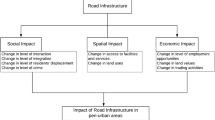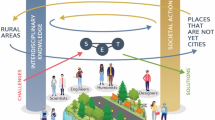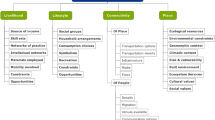Abstract
Sustainable urban transitions promise high mitigation and adaptation potential to address the effects of anthropogenic climate change. The two coastal megacities studied in this paper, Shanghai and Istanbul, have the potential for low-carbon urban transitions that can destabilize existing regimes. The destabilization is brought about by the disruptive business model innovations of the sharing economy in Shanghai’s mobility sector and by the energy-efficient practices developed alongside the intensification of the building sector through the process of urban renewal in Istanbul. However, the emergence of such urban transitions through the actions of agents relies on the existence of enabling environments for regime destabilization. In a comparative case study of Shanghai and Istanbul, we assess the challenges of realizing regime destabilization opportunities through an enabling environment framework. We find that without adequate enabling environments for regime destabilization, urban transitions to sustainability may fail to achieve effective low-carbon action and make progress towards meeting the sustainable development goals. We also show that while deliberate and collective efforts are underway from multiple agents within and beyond the two megacities, the environments for regime destabilization in the building and transport sectors considered remain insufficient primarily due to conflicting priorities among key agents in the underlying urban systems.
Similar content being viewed by others
References
Acar O (2013) Turkey’s 2023 vision: an evaluation from the energy perspective. The Economic Policy Research Foundation of Turkey (tepav), Paris
Anguelovski I, Chu E, Carmin J (2014) Variations in approaches to urban climate adaptation: experiences and experimentation from the global South. Glob Environ Chang 27:156–167
Bergek A, Berggren C, Magnusson T, Hobday M (2013) Technological discontinuities and the challenge for incumbent firms: destruction, disruption or creative accumulation? Res Policy 42:1210–1224
Berkhout F (2006) Normative expectations in systems innovation. Tech Anal Strat Manag 18:299–311
Berube A, Leal Trujillo J, Ran T, Parilla J (2015) 2014 global metro monitor. Brookings Institution, Washington DC
Bettencourt LMA, Lobo J, Helbing D, Kühnert C, West GB (2007) Growth, innovation, scaling, and the pace of life in cities. Proc Natl Acad Sci U S A 104:7301–7306
Bisaro A, Hinkel J (2016) Governance of social dilemmas in climate change adaptation. Nat Clim Chang 6:354–359
Brundiers K, Eakin HC (2018) Leveraging post-disaster windows of opportunities for change towards sustainability: a framework. Sustainability 10:1390
Bulkeley H, Coenen L, Frantzeskaki N, Hartmann C, Kronsell A, Mai L et al (2016) Urban living labs: governing urban sustainability transitions. Curr Opin Environ Sustain 22:13–17
Castells M (2010) End of millennium, 2nd edn (with a new preface). Wiley-Blackwell, Oxford
Clewlow RR, Mishra GS (2017) Disruptive transportation: the adoption, utilization, and impacts of ride-hailing in the United States. University of California, Davis, Institute of Transportation Studies
de Haan J, Rotmans J (2011) Patterns in transitions: understanding complex chains of change. Technol Forecast Soc Chang 78:90–102
DoS ShGov (Department of Statistics of Shanghai Municipal People's Government) (2015) Shanghai statistical yearbook. China Statistics Press, Shanghai
Duzgun B, Komurgoz G (2014) Turkey’s energy efficiency assessment: White Certificates Systems and their applicability in Turkey. Energy Policy 65:465–474
EITC ShGov (Economic and Information Technology Commission of Shanghai Municipal People's Government) (2015) Annual report on Shanghai industry and informatization development: Smart city, Shanghai Scientific and Technological Literature. Press, Shanghai
Emirbayer M, Mische A (1998) What is agency? Am J Sociol 103:962–1023
Energy Charter Secretariat (2003) In-depth review of energy efficiency policies and programmes of Turkey. Energy Charter Secretariat, Brussels
Energy Charter Secretariat (2004) In-depth energy efficiency policy: review of the Republic of Turkey. Energy Charter Secretariat, Belgium
Erbas A (2013) Central business district planning and the sustainable urban development process in Istanbul. The Sustainable City VIII (2 Volume Set). Urb Reg Sustain 179:169–179
Evans L, Maio GR, Corner A, Hodgetts CJ, Ahmed S, Hahn U (2013) Self-interest and pro-environmental behaviour. Nat Clim Chang 3:122–125
Farla J, Markard J, Raven R, Coenen L (2012) Sustainability transitions in the making: a closer look at actors, strategies and resources. Technol Forecast Soc Chang 79:991–998
Fiorino DJ (2010) Sustainability as a conceptual focus for public administration. Public Adm Rev 70:78–88
Fischer-Kowalski M, Rotmans J (2009) Conceptualizing, observing, and influencing social–ecological transitions. Ecol Soc 14
Folberth GA, Butler TM, Collins WJ, Rumbold ST (2015) Megacities and climate change – a brief overview. Environ Pollut 203:235–242
Foxon TJ, Hammond GP, Pearson PJ (2010) Developing transition pathways for a low carbon electricity system in the UK. Technol Forecast Soc Chang, 77(8):1203–1213
Frantzeskaki N, Wittmayer J, Loorbach D (2014) The role of partnerships in ‘realising’ urban sustainability in Rotterdam’s City Ports Area, The Netherlands. J Clean Prod 65:406–417
Frantzeskaki N, Dumitru A, Anguelovski I, Avelino F, Bach M, Best B et al (2016) Elucidating the changing roles of civil society in urban sustainability transitions. Curr Opin Environ Sustain 22:41–50
Garud R, Karnøe P (2003) Bricolage versus breakthrough: distributed and embedded agency in technology entrepreneurship. Res Policy 32:277–300
GAWC (2012) Globalization and world cities research network. World According to GaWC 2012
Geels FW (2002) Technological transitions as evolutionary reconfiguration processes: a multi-level perspective and a case study. Res Policy 31:1257–1274
Geels FW (2010) Ontologies, socio-technical transitions (to sustainability), and the multi-level perspective. Res Policy 39:495–510
Geels FW (2011) The multi-level perspective on sustainability transitions: responses to seven criticisms. Environl Innov Soc Trans 1:24–40
Geels FW (2014) Regime resistance against low-carbon transitions: introducing politics and power into the multi-level perspective. Theor Culture Soc 31:21–40
Geels FW (2016) Comparing transition PATHWAYS in different countries, EU FP7 PATHWAYS project: exploring transition pathways to sustainable, low carbon societies, grant agreement number 603942, Manchester, UK
Geels FW, Schot J (2007) Typology of sociotechnical transition pathways. Res Policy 36(3):399–417
Giddens A (1976) New rules of sociological method. Hutchinson, London
Glaeser E (2000) Urban and regional growth. Handbook Econ Geography 83:98
Grin (2010, 2010) The governance of transitions. An agency perspective. In: Grin J, Jan R, Schot JW (eds) Transitions to sustainable development. New directions in the study of long term transformative change, Routledge, pp 265–284
Han J, Fontanos P, Fukushi K, Herath S, Heeren N, Naso V, Cecchi C, Edwards P, Takeuchi K (2012) Innovation for sustainability: toward a sustainable urban future in industrialized cities. Sustain Sci 7:91–100
Heiskanen E, Kivisaari S, Lovio R, Mickwitz P (2009) Designed to travel? Transition management encounters environmental and innovation policy histories in Finland. Policy Sci 42(4):409
Hestad D, Tàbara JD, Thornton TF (2019) Transcending unsustainable dichotomies in management: lessons from Sustainability-Oriented Hybrid Organisations in Barcelona. J Clean Prod:118766
Hodson M, Marvin S (2010) Can cities shape socio-technical transitions and how would we know if they were? Res Policy 39:477–485
Hölscher K, Frantzeskaki N, Loorbach D (2019) Steering transformations under climate change: capacities for transformative climate governance and the case of Rotterdam, the Netherlands. Reg Environ Chang 19:791–805
İBB (2009) İstanbul Olası Deprem Kayıp Tahminleri. İstanbul Büyükşehir Belediyesi, Deprem Risk Yönetimi ve Kentsel İyileştirme Daire Başkanlığı, Deprem ve Zemin İnceleme Müdürlüğü
ICCAP (2018) Istanbul Climate Change Action Plan 2016–2018. https://www.iklim.istanbul. Accessed 21 July 2018
IEA (International Energy Agency) (2016) Energy policies of IEA countries Turkey 2016 review. OECD/IEA, Paris https://www.iea.org/publications/freepublications/publication/EnergyPoliciesofIEACountriesTurkey.pdf. Accessed 21 June 2017
IMSP (2015) Istanbul Metropolitan Strategic Plan for 2015–2019. http://www.ibb.gov.tr/enUS/Organization/Birimler/StratejikPlanlamaMd/Documents/stratejik_plan_2015-2019.pdf. Accessed 21 January 2016
Jacob K, Graaf L, Bär H (2014) Transformative environmental policy. Freie Universität Berlin, Environmental Policy Research Centre
Jørgensen U (2012) Mapping and navigating transitions—the multi-level perspective compared with arenas of development. Res Policy 41:996–1010
Kearney AT (2016) Global cities 2016. AT Kearney
Kemp R, Rotmans J (2009) Transitioning policy: co-production of a new strategic framework for energy innovation policy in the Netherlands. Policy Sci, 42(4):303
Kennedy CA, Stewart I, Facchini A et al (2015) Energy and material flows of megacities. Proc Natl Acad Sci 112:5985–5990
Kettl DF (2002) The transformation of governance: public administration for twenty-first century America. John Hopkins University Press, Baltimore
Kivimaa P, Kern F (2016) Creative destruction or mere niche support? Innovation policy mixes for sustainability transitions. Res Policy 45:205–217
Köhler J, Geels FW, Kern F, Markard J, Onsongo E, Wieczorek A et al (2019) An agenda for sustainability transitions research: state of the art and future directions. Environl Innov Soc Trans
Kuokkanen A, Yazar M (2018) Cities in sustainability transition: comparing Helsinki and Istanbul. Sustainability 5:1421
Kuokkanen A, Nurmi A, Mikkilä M, Kuisma M, Kahiluoto H, Linnanen L (2018) Agency in regime destabilization through the selection environment: the Finnish food system’s sustainability transition. Res Policy 47:1513–1522
Kuyucu T, Ünsal Ö (2010) ‘Urban transformation’ as state-led property transfer: an analysis of two cases of urban renewal in Istanbul. Urban Stud 47(7):1479–1499
Lan J, Ma Y, Zhu D, Mangalagiu D, Thornton TF (2017) Enabling value co-creation in the sharing economy: the case of Mobike. Sustainability 9:9
Leipprand A, Flachsland C (2018) Regime destabilization in energy transitions: the German debate on the future of coal. Energy Res Soc Sci 40:190–204
Lorrain D (2014) Governing megacities in emerging countries. Ashgate, Farnham
Lovering J, Evren Y (2011) Urban development and planning in Istanbul. Int Plan Stud 16:1–4
Ma Y, Lan J, Thornton T, Mangalagiu D, Zhu D (2018a) Challenges of collaborative governance in the sharing economy: the case of free-floating bike sharing in Shanghai. J Clean Prod
Ma Y, Rong K, Mangalagiu D, Thornton TF, Zhu D (2018b) Co-evolution between urban sustainability and business ecosystem innovation: evidence from the sharing mobility sector in Shanghai. J Clean Prod 188:942–953
Markard J, Raven R, Truffer B (2012) Sustainability transitions: an emerging field of research and its prospects. Res Policy 41:955–967
McCormick K, Anderberg S, Coenen L, Neij L (2013) Advancing sustainable urban transformation. J Clean Prod 50:1–11
Metin E (2009) Energy efficiency institutions in Turkey, general directorate of electrical power resources. Survey and Development Administration, Amman
Mey F, Diesendorf M, MacGill I (2016) Can local government play a greater role for community renewable energy? A case study from Australia. Energy Research & Social Science 21:33–43
MoEU (Ministry of Environment and Urbanisation) (2018) İlan Edilen Riskli Alanlar. http://istanbulakdm.csb.gov.tr/ilan-edilen-riskli-alanlar-i-3598. Accessed 21 July 2018
Mollaoglu S, Chergia C, Ergen E, Syal M (2016) Diffusion of green building guidelines as innovation in developing countries. Constr Innov 16:11–29
Nevens F, Roorda C (2013) A climate of change: a transition approach for climate neutrality in the city of Ghent (Belgium). Sustain Cities Soc 10:112–121
Nevens F, Frantzeskaki N, Gorissen L, Loorbach D (2013) Urban transition labs: co-creating transformative action for sustainable cities. J Clean Prod 50:111–122
North DC (1990) Institutions, institutional change and economic performance. Cambridge University Press, Cambridge
Orach K, Schlüter M (2016) Uncovering the political dimension of social-ecological systems: contributions from policy process frameworks. Glob Environ Chang 40:13–25
Ornetzeder M, Rohracher H (2013) Of solar collectors, wind power, and car sharing: comparing and understanding successful cases of grassroots innovations. Glob Environ Chang 23:856–867
Ostrom E, Burger J, Field CB, Norgaard RB, Policansky D (1999) Revisiting the commons: local lessons, global challenges. Science 284:278
Oye K, Maxwell JH (1994) Self-interest and environmental management. J Theor Polit 6:593–624
Pelling M, Manuel-Navarrete D (2011) From resilience to transformation: the adaptive cycle in two Mexican urban centers. Ecol Soc 16
Pincetl S, Chester M, Circell G, Fraser A, Mini C, Murphy S et al (2014) Enabling future sustainability transitions: an urban metabolism approach to Los Angeles. J Ind Ecol 18:871–882
Robinson J (2015) Thinking cities through elsewhere: comparative tactics for a more global urban study. Prog Hum Geogr
Schulz K, Siriwardane R (2015) Depoliticised and technocratic. Normativity and the politics of transformative adaptation
Seto KC, Güneralp B, Hutyra LR (2012) Global forecasts of urban expansion to 2030 and direct impacts on biodiversity and carbon pools. Proc Natl Acad Sci 109:16083–16088
Seyfang G (2010) Community action for sustainable housing: building a low-carbon future. Energy Policy 38:7624–7633
Smith A, Voss JP, Grin J (2010) Innovation studies and sustainability transitions: the allure of the multi-level perspective and its challenges. Res Policy 39:435–448
Sorenson KH, Williams R (2002) Shaping technology, guiding policy: concepts, spaces and tools. Edward Elgar, Cheltenham
Späth P, Rohracher H (2015) Conflicting strategies towards sustainable heating at an urban junction of heat infrastructure and building standards. Energy Policy 78:273–280
Starr S (2018) A seismic task: Istanbul awaits a once-in-a-century earthquake. The Irish Times https://www.irishtimes.com/news/world/europe/a-seismic-task-istanbul-awaits-a-once-in-a-century-earthquake-1.3605508. Accessed 21 July 2018
Talbot C, Pollitt C, Bathgate K, Caulfield J, Reilly A & Smullen A (2000) The idea of agency. In American Political Studies Association Conference, Washington, DC
TCIP (Turkish Natural Catastrophe Insurance Pool for 2018) (2018) https://www.dask.gov.tr/toplumsal-paylasim-etkilesimli-deprem.html. Accessed 2 April 2018
Thornton TF, Mangalagiu D, Ma Y, Lan J, Yazar M, Saysel AK, Chaar AM (2019) Cultural models of and for urban sustainability: assessing beliefs about Green-Win. Clim Chang:1–17
Turk Stat (Turkish Statistical Institute) (2016) Address based population registration system results. http://www.turkstat.gov.tr/PreTablo.do?alt_id=1059. Accessed 18 Jan 2017
Turkish Government (2004a) Energy efficiency strategy for Turkey in the frame of the project: improvement of energy efficiency in Turkey. Ministry of Energy and Natural Resources, Ankara
Turkish Government (2004b) Needs assessment study in the frame of the project: improvement of energy efficiency in Turkey. Ministry of Energy and Natural Resources, Turkey
Turnheim B, Geels FW (2013) The destabilisation of existing regimes: confronting a multi-dimensional framework with a case study of the British coal industry (1913–1967). Res Policy 42:1749–1767
UNDP (2010) Promoting energy efficiency in buildings in Turkey. UNDP, Ankara
UN-Habitat (2016) Urbanization and development: emerging futures, United Nations Human Settlements Programme (UN-habitat). Nairobi, Kenya
Uysal UE (2012) An urban social movement challenging urban regeneration: the case of Sulukule, Istanbul. Cities 29:12–22
Williams J (2016) Can low carbon city experiments transform the development regime? Futures 77:80–96
Wolfram M, Frantzeskaki N (2016) Cities and systemic change for sustainability: prevailing epistemologies and an emerging research agenda. Sustainability 8:144. https://doi.org/10.3390/su8020144
World Bank (2015) Republic of Turkey: institutional review of energy efficiency. The World Bank Group, Washington DC
Yazar M, Hestad D, Mangalagiu D, Saysel AK, Ma Y, Thornton TF (2019) From urban sustainability transformation to green gentrification: urban renewal in Gaziosmanpasa, Istanbul. Clim Chang. https://doi.org/10.1007/s10584-019-02509-3
Acknowledgements
We would like to thank all participants to the two workshops held in Istanbul and Shanghai and to the intervieewes. This paper benefited from the thoughtful comments of three anonymous reviewers.
Funding
This work was supported by the EU Horizon 2020 GREEN-WIN project (642018 RIA).
Author information
Authors and Affiliations
Corresponding author
Additional information
Publisher’s note
Springer Nature remains neutral with regard to jurisdictional claims in published maps and institutional affiliations.
This article is part of a Special Issue on “Win-Win Solutions to Climatic Change” edited by Diana Mangalagiu, Alexander Bisaro, Jochen Hinkel, and Joan David Tàbara
Rights and permissions
About this article
Cite this article
Yazar, M., Hestad, D., Mangalagiu, D. et al. Enabling environments for regime destabilization towards sustainable urban transitions in megacities: comparing Shanghai and Istanbul. Climatic Change 160, 727–752 (2020). https://doi.org/10.1007/s10584-020-02726-1
Received:
Accepted:
Published:
Issue Date:
DOI: https://doi.org/10.1007/s10584-020-02726-1




